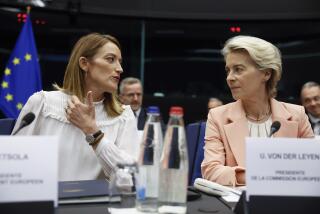BUREAUCRACY : Europeans United on This: They Hate Technocrats : The EC’s bureaucrats have been called ‘miserable little office workers.’ They say they have been misunderstood.
- Share via
BRUSSELS — They are the Europeans that everybody loves to hate.
British Foreign Secretary Douglas Hurd says they like to “meddle in every nook and cranny of national life.” Jacques Calvet, president of the French car maker Peugeot, says their goal is “bureaucratic domination” of Europe. A Brussels newspaper calls them “miserable little office workers.”
They are the 17,000 bureaucrats working for the European Community’s commission, the executive arm of the fledgling European government headquartered in Brussels.
Yet on closer inspection, it turns out that the “Eurocrats” almost always do nothing more than their political leaders want them to do.
If some of their regulations, including those that classify carrots as a fruit and forbid cucumbers that are excessively curved, seem silly, it is only because at least one of the 12 EC member nations wanted them that way. On close inspection, most of the sometimes bizarre rulings that issue from Brussels amount to nothing more than efforts to protect a national interest.
“We should not be unfair to Brussels,” German Chancellor Helmut Kohl says. “Quite a few European regulations which cause the public to shake their heads in disbelief are in fact the result of attempts to protect national interests.”
Yet like federal bureaucrats in Washington, the Eurocrats are popularly regarded as overpaid--the top salary is about $170,000 a year--under-worked and unresponsive to the public. Their apparently excessive zeal has taken much of the blame for the flagging popularity of European political union.
The 1991 Maastricht Treaty, which points the EC toward a single currency and common foreign and defense policies, was nearly defeated by French voters and the British Parliament, in considerable measure because of fear that the technocrats in Brussels were usurping national sovereignty.
Jacques Delors, who as president of the EC’s Executive Commission is the boss of all the Eurocrats, has ordered the bureaucracy to lie low and to regulate only when the member nations approve.
His order coincides with a natural winding down of rule-making by Brussels. By the beginning of this year, the EC had largely completed the task of forging itself into a “single market,” without barriers at national boundaries.
Establishing the single market required EC-wide regulations standardizing everything from truck safety to water quality. With that exercise mostly complete, the Eurocrats have less to do.
There are surprisingly few of them. The EC commission’s payroll of 17,000 is only about as big as Orange County’s and approximately 1% of the federal civilian work force in the United States.
One reason is that, with only a few exceptions, the EC commission does not administer any programs. And for the most part, Eurocrats propose policy but have scant authority to make it. Real decision-making power rests with government ministers from the 12 countries.
“Our reputation is based on a misconception that we have power,” says Michael Hocken, an official of one of the Eurocrats’ unions. “In fact, we don’t.”
But what they do have can get Eurocrats into plenty of controversy. For example, British grape growers are in a state of ferment over EC Regulation 822, which says that no new vineyards can be planted until 1996 in countries that produce more than 600,000 gallons of wine a year.
The regulation was aimed at limiting production--and thus supporting the price--in France, Italy, Spain and Germany, which are the EC’s big wine producers. Nobody had Britain in mind when the EC approved the production limits in the late 1980s.
But last year for the first time, British wine production topped the 600,000-gallon mark, and now British growers find themselves facing the same restrictions as their counterparts on the Continent. The British government is appealing to the EC commission for an exemption; meanwhile, British grape growers are fuming over one more intrusion by the overweening bureaucrats from Brussels.
More to Read
Sign up for Essential California
The most important California stories and recommendations in your inbox every morning.
You may occasionally receive promotional content from the Los Angeles Times.











